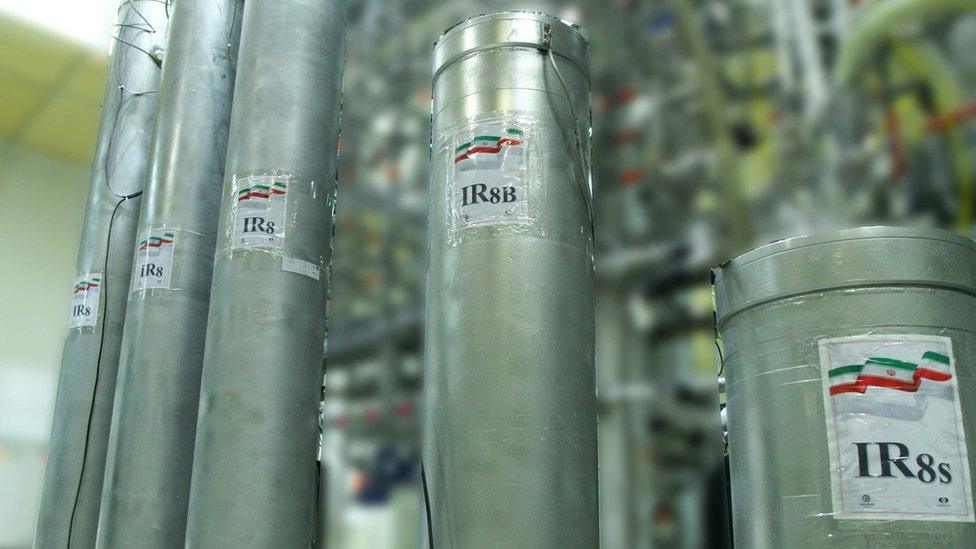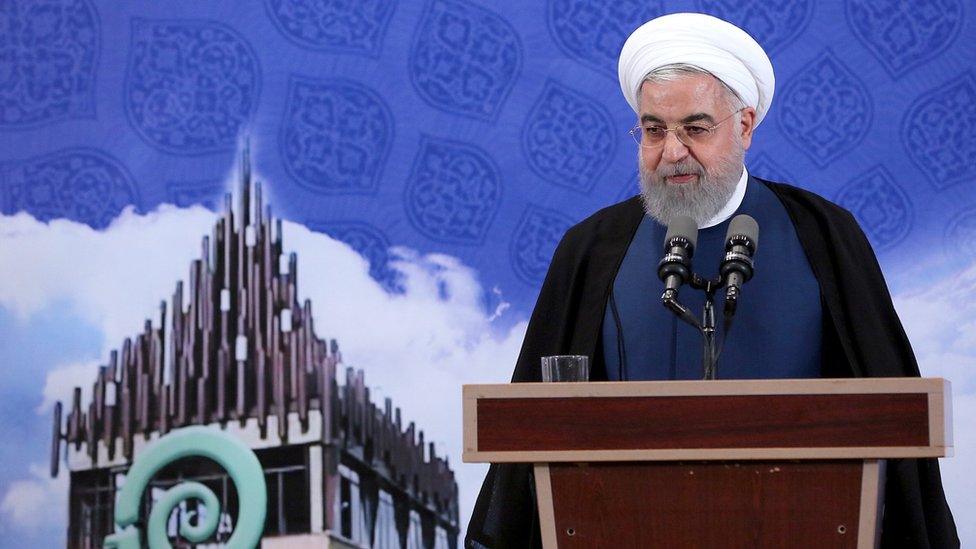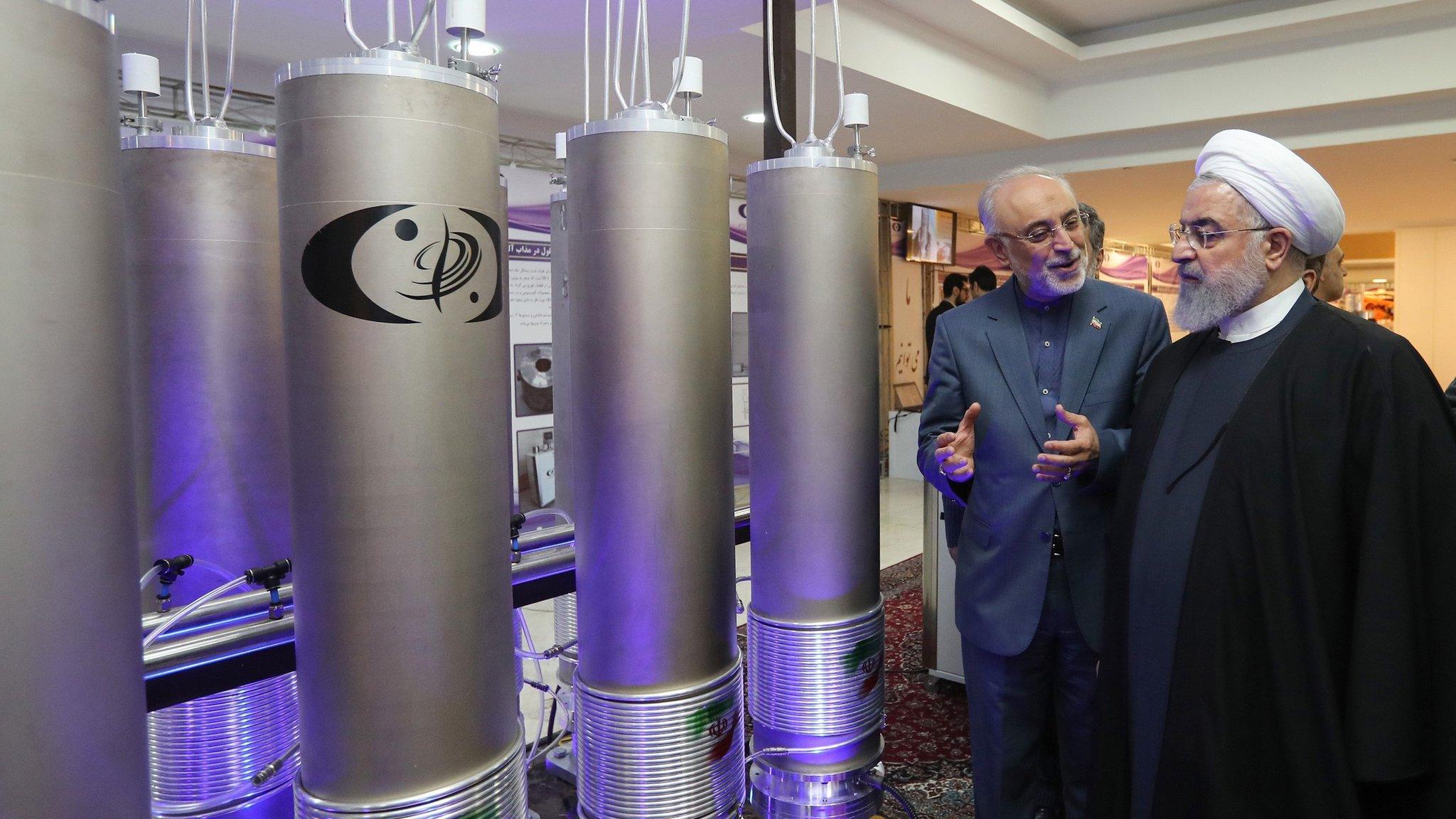Iran nuclear deal: Fordo uranium centrifuges to be injected with gas
- Published

On Monday, the Atomic Energy Organisation of Iran unveiled advanced centrifuges at Natanz
Iran will begin injecting gas into centrifuges used to enrich uranium at its underground Fordo facility on Wednesday, rolling back another commitment under a 2015 nuclear deal.
President Hassan Rouhani said the step was reversible if world powers party to the accord upheld their commitments.
Enriched uranium can be used to make reactor fuel but also nuclear weapons.
This is the fourth step taken by Iran since July in response to US sanctions reinstated by President Donald Trump.
Under the accord, Iran agreed to limit its sensitive nuclear activities and allow in international inspectors in return for the lifting of crippling economic sanctions.
Mr Trump abandoned it last year because he wanted to force Iran to negotiate a new agreement that would place indefinite curbs on its nuclear programme and also halt its development of ballistic missiles. But Iran has so far refused.
Feeling the squeeze: Iran sanctions explained
The other parties to the deal - the UK, France, Germany, China and Russia - have tried to keep it alive. But the sanctions have caused Iran's oil exports to collapse and the value of its currency to plummet, and sent its inflation rate soaring.
Iran has insisted its nuclear programme is entirely peaceful.
Before 2015, the country had two enrichment facilities - Natanz and Fordo - where uranium hexafluoride gas was fed into centrifuges to separate out the most fissile isotope, U-235.
The deal saw Iran agree to only produce low-enriched uranium, which has a 3-4% concentration of U-235, and can be used to produce fuel for nuclear power plants. Weapons-grade uranium is 90% enriched or more.


Iran also agreed to install no more than 5,060 of the oldest and least efficient centrifuges at Natanz until 2026, and not to carry out any enrichment at Fordo until 2031. The 1,044 centrifuges there were supposed to spin without uranium hexafluoride gas being injected.
In a speech broadcast on state television on Tuesday, Iran's president announced: "Starting from tomorrow, we will begin injecting gas at Fordo."
Mr Rouhani did not say whether the step, which will be carried out under the surveillance of the International Atomic Energy Agency (IAEA), would lead to the production of enriched uranium.
But Iran's envoy to the IAEA, Kazem Gharibabadi, later informed the agency in a letter that uranium hexafluoride would be the gas injected into the centrifuges.

President Hassan Rouhani stressed that all the step taken by Iran were reversible
Mr Rouhani said Iran was aware of the "sensitivity" of the other parties to the deal regarding Fordo, which was built in secret about 90m (300ft) under a mountain south of Tehran to shield it from air strikes.
"But at the same time when they uphold their commitments we will cut off the gas again… so it is possible to reverse this step."
On Monday, the head of the Atomic Energy Organisation of Iran (AEOI) said it had doubled the number of advanced centrifuges being operated at Natanz.
Ali Akbar Salehi told reporters it now possessed 60 IR-6 centrifuges, and that it could enrich uranium to 20% concentration "within four minutes" of being given an order. He had previously said the AEOI would need four days to do so.


A spokeswoman for the European Union External Action Service, Maja Kocijancic, told reporters it was concerned by President Rouhani's announcement.
French foreign ministry spokeswoman Agnes von der Muhll said it went against the nuclear deal, adding: "We are waiting with our partners for the next IAEA reports on Iran's announcements and actions."
Russian presidential spokesman Dmitry Peskov also expressed concern at Iran's latest move, adding: "We support the preservation of this deal."
- Published30 April 2021
